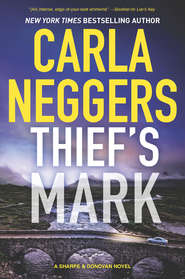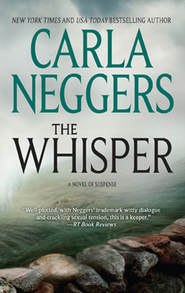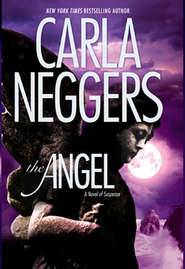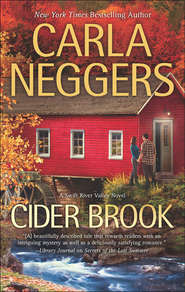По всем вопросам обращайтесь на: info@litportal.ru
(©) 2003-2024.
✖
Abandon
Автор
Год написания книги
2018
Настройки чтения
Размер шрифта
Высота строк
Поля
“What are you doing here?” Even to his own ear, Harris’s voice sounded pinched and frightened. “Come out where I can see you.”
“By all means.” Jesse moved into the doorway of the tiny entry. Behind him, the studio apartment—rented by the day and sometimes by the hour—was dark, casting his face into shadows. “Don’t think the FBI will come save you. They’re not out there, Harris. They haven’t found you. You’re not important enough for them to have you under surveillance.”
“That’s because I haven’t told them anything. What do you want?”
Jesse was dressed entirely in black. His hair was black, with random flecks of gray. He’d let his beard grow. He was in his early forties and looked wild, as if he’d just come out of the mountains or off a pirate ship.
But his eyes, Harris noted, were virtually colorless, utterly soulless.
Jesse held a knife in one hand. Casually, as if it should cause no concern.
Harris was no expert on weapons, but he knew it wasn’t a kitchen knife. One side of the blade was serrated, the other side smooth. Both would cut. An assault knife of some kind, he thought.
“You don’t need that,” he said.
“I’m afraid I do.” Jesse ran a thumb along the smooth edge of the blade, as if he wanted to test its sharpness, see his own blood. “A knife is fast, quiet. In many situations, it’s more useful than a gun. You agree, don’t you, Harris?”
Harris tried to ignore the thudding of his heart, and summoned the last shreds of his dignity, his honor. He’d let himself be lured and manipulated by this man and by Cal Benton, by his own greed and compulsions, his own need for drama.
Stonily, he said, “It’s Judge Mayer.”
Jesse laughed, a hollow sound that conveyed neither pleasure nor fellow-feeling. “I like that. You’d go to the gallows with a stiff upper lip, wouldn’t you?”
“I would hope not to go to the gallows at all.”
“A little late, Judge Mayer.”
“I suppose so,” he said without flinching. “I made my deal with the devil.”
“Oh, yes.” The colorless, soulless eyes flashed, and the light seemed to dance on the knife blade. Jesse lowered his voice. “So you did.”
In the cheap entry mirror, Mayer recognized his own stark look of fear.
No, he thought. Not fear.
Dread.
He took in a shallow breath. “I don’t have your money, Jesse. I don’t know where it is. That’s the truth. Double-crossing you wasn’t my idea.”
Outside, car tires screeched, but it was silent in the small, rented room. Harris had stayed here before. It was his refuge—his hiding place. He’d been so sure no one would think to look for him here.
“How did you find me?” he asked.
“You’re a creature of habits.”
“The bar…you followed me. Did you see me having coffee with Cal? Why didn’t you follow him?”
“He’s not the one who went to the FBI. Don’t try to pretend you’re the innocent here. Cal couldn’t have betrayed me without your help.”
Harris thought of his foyer at home, with its antique mirror and half-moon table. Once it had been filled with the sounds of running children and his wife’s welcome when he came home. He’d lost them all.
One beat, two beats passed. Harris absorbed the reality of just how much trouble he was in.
Finally, Jesse went on. “How much do you and Cal know about me?”
Harris didn’t hesitate. “Everything.”
He should have laid it all out for the FBI from the start and let the chips fall where they may. Instead, he had tried to play Andrew Rook the same way he’d played everyone else in his life who’d wanted to help him, to trust and believe in him. Subterfuge and betrayal were his art. His entertainment. He’d thought, why not practice what he was good at on the FBI? Rook was investigating, but he had little to go on. Harris had seen to that. He’d kept his revelations vague, promising specifics in future visits—keeping Rook’s interest without giving him anything concrete. Rook was in fish-or-cut-bait mode now. At their next meeting, he’d want details.
But Cal was right, Harris thought. He didn’t care about helping the FBI. He cared about saving his own skin.
The devil had come for his due, indeed.
“If you knew everything about me, Harris, you and Cal wouldn’t dare try to double-cross me.”
As if to further drive home his point, Jesse pressed his thumb onto the tip of his knife, drawing a pearl of his own blood.
“You’re a violent man, Jesse.” Harris felt some of his former presence on the bench come back to him. He’d never flinched in the face of what he had to hear and see in the courtroom. “You don’t use violence as a tool to get what you want. Violence is what you want.”
“That’s my secret, is it?”
“It’s your secret and it’s your weakness. Your obsession.”
Jesse smirked as he licked the pea of blood off his thumb. “You Princeton types. You’ve read too many Greek tragedies. I want my money. I want everything you and Cal have on me. I want to know what you know.”
“I’d never use what I know against you, and Cal won’t, either. It’s his insurance policy—to keep you out of his life. Jesse…” Harris gulped in air. Did he dare hope he could negotiate a deal with this man? “Jesse, you can trust me not to talk.”
“Seeing how you’ve been meeting with an FBI agent, no, you lying son of a bitch, I can’t trust you not to talk.” Jesse sprang forward and placed the knife blade at the side of Mayer’s throat. “I want my money.”
“I can’t—”
“You can, Harris. You can get my money.” He lowered his knife and stepped back, the split second of explosive anger dissipated. “We’ll find a way. Together.”
Through violence, Harris thought.
Through death.
“In the meantime,” Jesse said calmly, with a smile so cold it could only be the devil’s, “tell me something. Just between us.”
“What?”
“Who was the redhead with Judge Peacham last night?”
Four
On Friday morning, Rook awoke early to catch a flight to New Hampshire. His head pounded, and he was in a foul mood. He’d anticipated a very different weekend for himself. He’d expected to show Mackenzie the small Cape Cod house he’d inherited when his grandmother died a year ago. After seven years working in south Florida, he’d been offered an assignment in Washington, his home turf. Leaving him the house was his grandmother’s way of getting him to stay.
It was on a quiet, tree-lined street in Arlington. His two older brothers lived within walking distance. His younger brother was a short drive away. Andrew was surrounded by Rooks, every one of them in law enforcement. He’d been infected by the Rook sense of responsibility, the hard-working, straightforward Rook values, the Rook propensity for home and hearth. He was thirty-five. The pressure was on. It was time for him to settle down. Time to start a family. All he had to do was look at the work to be done on his house, see the remnants of his boyhood tree house up in the big oak in the backyard, and he could feel it.











